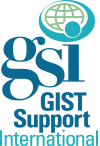Sorafenib for GIST
At the January 2008 ASCO GI Cancers Symposium, Dr. Nimeiri presented a paper describing the first preliminary results of the ongoing Phase II trial of sorafenib (brand name Nexavar) for gastrointestinal stromal tumor. Click the title below for the full abstract. After linking to the abstract on the ASCO site, you can click the icons shown below the abstract to either hear a webcast and see the slides (video icon) or to see the slides only (slides icon).
Title: Activity of sorafenib (SOR) in patients (pts) with imatinib (IM) and sunitinib (SU)-resistant (RES) gastrointestinal tumors (GIST): A phase II trial of the University of Chicago Phase II Consortium
Authors: H. S. Nimeiri, R. G. Maki, K. Kasza, D. D’Adamo, W. Chow, P. Dy, B. Polite, J. Jin, E. E. Vokes, H. L. Kindler
Sorafanib (Nexavar) is an inhibitor of KIT, VEGF receptor, and PDGF receptor B. This drug has been approved by the FDA for kidney cancer. You can read more about it at the manufacturer’s site www.nexavar.com
This trial of sorafenib (Nexavar) was begun prior to the approval of sunitinib (Sutent), and the original requirement was that subjects must have had progression on imatinib. After Sutent was approved for GIST the sorafanib trial had to change its requirements to accept only patients who had experienced progression on both imatinib and sunitinib. As a result, there are two groups of patients in this trial: a small group (N=6) of imatinib-resistant patients, and a larger group (N=18 at this report date) of patients who are resistant to both imatinib and sunitinib. The trial will continue recruiting until there are 32 double-resistant patients.
Patients take sorafenib 400 mg orally twice per day and receive CT scans every 2 months. At the time of this presentation subjects had completed a median of 4 cycles of 28 days each (range 1-14 cycles).
A majority of patients (67%) required dose reductions due to side effects. The severe (grade 3-4) side effects reported were hand-foot syndrome (28%), hypertension (24%), rash (20%), diarrhea (12%), fatigue (8%), bleeding (8%), thrombosis (4%), perforation (4%), and anemia (4%).
During her oral presentation, Dr. Nimieri updated the published abstract with the following data. Among the 6 imatinib-resistant patients, 1 achieved partial response and 3 achieved stable disease. Among the 18 imatinib+sunitinib-resistant patients, 11% achieved partial response and 61% achieved stable disease. This represents 72% clinical benefit (disease control) for the larger group.
To date the median progression-free survival is 5.3 months, and the median overall survival is 13 months. (These figures include the patients who did not receive benefit from the drug.) It is encouraging that the majority of patients are receiving clinical benefit in this trial.
Mutation analyses of the patients’ tumors are in progress and the investigators intend to correlate mutation results with clinical benefit patterns.
June 2008 ASCO Update
A further update about this sorafenib trial was given at the June 2008 ASCO meeting. You can link to the abstract and then click an icon below the abstract to see the slides without hearing the talk or to hear the webcast and see the slides.
Activity of sorafenib (SOR) in patients (pts) with imatinib (IM) and sunitinib (SU)-resistant (RES) gastrointestinal stromal tumors (GIST): A phase II trial of the University of Chicago Phase II Consortium.
Presenter: Lauren Wiebe, MD Meeting: 2008 ASCO Annual Meeting Session: Emerging Targets for Sarcoma Therapy (Clinical Science Symposium)
In this June 2008 update the number of subjects had increased to 23 patients resistant to both imatinib and sunitinib. There was a 76% disease control rate: 4 partial response, 18 stable disease, 7 progressive disease. The mean progression-free survival for patients resistant to both imatinib and sunitinib was 5.7 months.
Mutation analysis, newly available for 22 patients (5 with imatinib resistance only, and 17 with resistance to both imatinib and sunitinib), revealed 14 of the 22 to have exon 11 KIT gene mutations. Two exon-9-mutant patients both had stable disease for longer than 6 months. One patient displayed the PDGFRA mutation D842V (which is imatinib resistant) and had stable disease for greater than 6 months on sorafenib.
For more about sorafenib and a link to the trial description, see our page Sorafenib (Nexavar).

